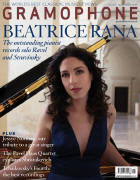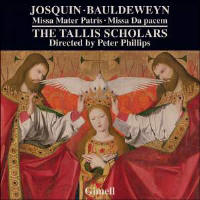Texte paru dans: / Appeared in: |
|
 |
Outil de traduction (Très approximatif) |
|
Reviewer:
Edward Breen Phillips recently wrote how he feels each of Josquin’s Masses has its own ‘sound world’ (The Musical Times, autumn 2018). As we approach the end of his recording project, this comment comes into sharper focus, and particularly so in the case of Missa Mater Patris. One can argue that this is a late work on the grounds it is potentially a lament for Brumel, who died around 1512 and whose motet provides the model. But also, as Phillips suggests, this ‘forthright’ and ‘bracingly simple’ style could be the refinement of a lifetime’s work. One could say that of this performance as well: it is scored for low voices and these singers find a warmth in the homophonic writing that blooms into an unhurried grandeur. Compared with Chanticleer (7/94) this is a much tighter ensemble in both tone and phrasing, and there are several outstandingly wellcontrolled spans of two-voice polyphony. Listen especially for the way these singers glide through the exotic chord-chains in the Sanctus: I can’t help but be reminded of the confident sweep of the Andrews Sisters. This is glorious stuff indeed. Missa Da pacem was once thought to be by Josquin and recorded on LP as such several times in the early ’70s, until it was shown to be by the little-known Noel Bauldeweyn ( fl1509-13). Phillips includes it in his cycle as an exercise in tracing Josquin’s influence. It’s worth it for its especially beautiful Agnus Dei III, which is sung here with charm and tenderness. |
|




